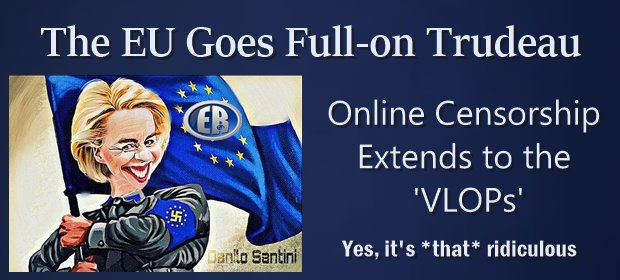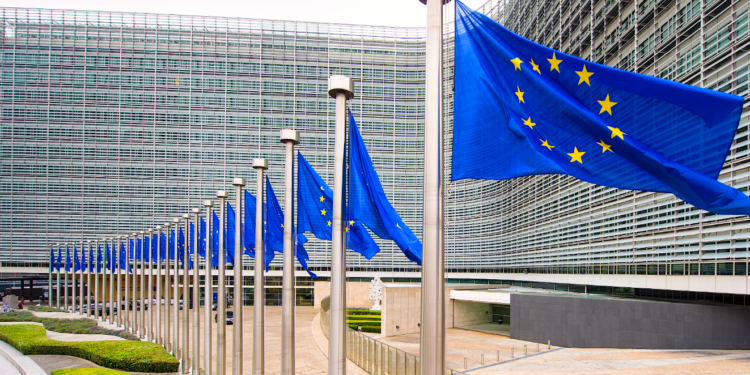
ER Editor: See this we published on Canada recently, in similar vein —
Trudeau gov’t internet censorship Bill C-11 becomes law

The world is a very contradictory place right now. CNN was bought a while back by a friend of Trump, and various reporters, including one producer, have gone (including Cuomo, Stelter, recently Don Lemon); Twitter went to Musk; Musk recently did a hatchet job-interview with a BBC reporter (and took aim at Canada’s CBC), which was followed by layoffs of top BBC reporters, plus the stepping down of its chairman just this past week. And Tucker Carlson famously left Fox this week, putting it in trouble and leaving Tucker free to be his own man (hopefully). Anglosphere MSM is getting taking out from within while the EU and Canada play tinpot dictators, or appear to do so.
Notice how the acronym VLOP below resembles ‘flop’. Somebody’s having fun.
********
The EU Extends its Censorship Powers

Or as a subheading in the Commission announcement pithily puts it: “More diligent content moderation, less disinformation.”
As discussed in my previous articles on the DSA here and here, the legislation creates enforcement mechanisms – most notably, the threat of massive fines – for ensuring that online platforms comply with commitments to remove or otherwise suppress ‘disinformation’ that they have undertaken in the EU’s hitherto ostensibly voluntary Code of Practice on Disinformation.
Unsurprisingly, the list of designated VLOPs includes a variety of services offered by all the most high-profile signatories of the Code: Twitter, Google, Meta, Microsoft, and TikTok.
But, far more surprisingly, it also includes several platforms that are not signatories of the Code and to which the Commission appears now to be extending the Code and DSA requirements unilaterally. The latter include Amazon, Apple (in the form of the App Store) and even Wikipedia.
The Commission has even designated the favourite messaging service of every filter-crazy preteen, Snapchat! Curiously, however, WhatsApp is not named.
Since many of the newly designated platforms are not publishing platforms per se, it is unclear how exactly the ”content moderation’ requirements will apply to them.
What will ‘content moderation’ mean for Amazon, for example? That user reviews containing alleged ‘disinformation’ will have to be removed? Or will books or magazines that the European Commission deems to be vessels or purveyors of ‘disinformation’ have to be purged from the catalogue?
The inclusion of the Apple App Store is perhaps even more ominous. Will its subjection to the Code and DSA requirements provide an indirect route for the EU to demand the removal of apps of non-designated platforms that the Commission deems channels of disinformation? Telegram, for example?
And what about Wikipedia? The DSA invests the European Commission with the power to impose fines of up to 6% of global turnover on VLOPs. But Wikipedia is a non-profit that is funded by donations. It does not sell anything, so it does not have any turnover. But presumably the Commission plans to treat its fundraising income as such.
Furthermore, Wikipedia is not a publishing platform, but a user-edited collaborative encyclopedia. If it is to be subject to the EU’s ‘content moderation’ requirements, what can this possibly mean other than that Wikipedia will have to remove user edits that the European Commission deems to be ‘mis-‘ or ‘disinformation’? The European Commission will thus become the very arbiter of encyclopedic knowledge and truth.
The European Commission’s list of designated entities, comprising 17 Very Large Online Platforms as well as two Very Large Online Search Engines (VLOSEs), is reproduced below.
Very Large Online Platforms:
- Alibaba AliExpress
- Amazon Store
- Apple AppStore
- Booking.com
- Google Play
- Google Maps
- Google Shopping
- Snapchat
- TikTok
- Wikipedia
- YouTube
- Zalando
Very Large Online Search Engines:
- Bing
- Google Search
Robert Kogon is a pen name for a widely-published financial journalist, translator and researcher working in Europe. Subscribe to his Substack and follow him on Twitter. This article was first published by the Brownstone Institute.
************
Source

••••
The Liberty Beacon Project is now expanding at a near exponential rate, and for this we are grateful and excited! But we must also be practical. For 7 years we have not asked for any donations, and have built this project with our own funds as we grew. We are now experiencing ever increasing growing pains due to the large number of websites and projects we represent. So we have just installed donation buttons on our websites and ask that you consider this when you visit them. Nothing is too small. We thank you for all your support and your considerations … (TLB)
••••
Comment Policy: As a privately owned web site, we reserve the right to remove comments that contain spam, advertising, vulgarity, threats of violence, racism, or personal/abusive attacks on other users. This also applies to trolling, the use of more than one alias, or just intentional mischief. Enforcement of this policy is at the discretion of this websites administrators. Repeat offenders may be blocked or permanently banned without prior warning.
••••
Disclaimer: TLB websites contain copyrighted material the use of which has not always been specifically authorized by the copyright owner. We are making such material available to our readers under the provisions of “fair use” in an effort to advance a better understanding of political, health, economic and social issues. The material on this site is distributed without profit to those who have expressed a prior interest in receiving it for research and educational purposes. If you wish to use copyrighted material for purposes other than “fair use” you must request permission from the copyright owner.
••••
Disclaimer: The information and opinions shared are for informational purposes only including, but not limited to, text, graphics, images and other material are not intended as medical advice or instruction. Nothing mentioned is intended to be a substitute for professional medical advice, diagnosis or treatment.





Leave a Reply